

Ever since the emergence of talking pictures, schools have been a major subject of both Hollywood movies and documentary films. One consistent theme of Hollywood portrayals of schools – from Blackboard Jungle (1955), Up the Down Staircase (1967) and Stand and Deliver (1988) to Mr. Holland’s Opus (1995), October Sky (1999) and Freedom Writers (2007) – has been the idealistic teacher fighting to serve his and her students against overwhelming odds, including uncaring administrators, cynical colleagues, a stultifying required curriculum that crushes the spirit of teachers and students alike, dilapidated conditions, budget cuts, unruly and hostile students, or students suffering from the symptoms of poverty or neglect. The underlying message is that while occasionally a rare teacher can light a spark in a few students, our public schools are failing most of the students they are supposed to serve. Most documentaries about education –
» Read more about: A Harsh Schooling: The War Against Public Education »


 Before January 2009, the filibuster was used only for measures and nominations on which the minority party in the Senate had their strongest objections. Since then, Senate Republicans have filibustered almost everything, betting that voters will blame Democrats for the dysfunction in Congress as much as they blame the GOP.
Before January 2009, the filibuster was used only for measures and nominations on which the minority party in the Senate had their strongest objections. Since then, Senate Republicans have filibustered almost everything, betting that voters will blame Democrats for the dysfunction in Congress as much as they blame the GOP.
So far the bet is paying off because the press has failed to call out the GOP – which is now preventing votes on the President’s choices for three D.C. Circuit Court nominees, the Labor Department and the EPA, the Consumer Finance Protection Bureau, and the National Labor Relations Board. (The GOP has blocked all labor board nominees, some to whom the President gave recess appointments, but he’s now asking approval for all.)
The GOP has already violated hundreds of years of Senate precedent by filibustering the nomination of a Cabinet secretary, Chuck Hagel for Secretary of Defense,
» Read more about: Clinton Official: New GOP Hates Government and Governing »


I am a tipped worker at a restaurant, so according to Illinois law I only have to be paid 60 percent of the minimum wage, or $4.95 an hour. I am a single mother with a five-month-old son. I am worried because with the economy going so badly, people aren’t eating out as much or tipping as much. If things get worse and I can’t rely on my tips, then I am going to need to use things like food stamps. I am not able to save any money because I am living paycheck to paycheck, so if something unexpected happened I wouldn’t know what to do. We need this new law to raise the minimum wage because it would change the law for tipped workers so that they would get 100 percent of the minimum wage. We shouldn’t have to depend on something as unreliable as tips to survive.
» Read more about: Paycheck to Paycheck: Minimum Wage Stories »
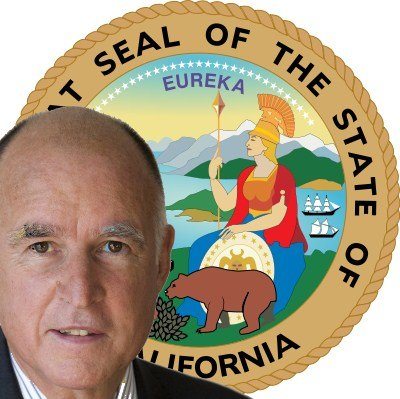
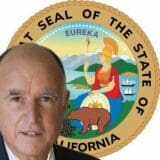
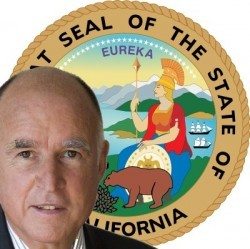 Governor Jerry Brown signed into law Thursday the “Governor’s Economic Development Initiative,” which radically overhauls California’s troubled Enterprise Zone program. The signing took place in San Diego at the headquarters of Takeda California, a pharmaceutical company. State legislature backers of the new program, which consists of Assembly Bill 93 and Senate Bill 90, say it will stimulate economic activity and create good jobs for Californians via a three-pronged approach.
Governor Jerry Brown signed into law Thursday the “Governor’s Economic Development Initiative,” which radically overhauls California’s troubled Enterprise Zone program. The signing took place in San Diego at the headquarters of Takeda California, a pharmaceutical company. State legislature backers of the new program, which consists of Assembly Bill 93 and Senate Bill 90, say it will stimulate economic activity and create good jobs for Californians via a three-pronged approach.
The first prong is a sales tax exemption on research and development equipment purchases for biotechnology and manufacturing firms. The second is a series of credits given to businesses that hire in regions with high unemployment and poverty rates. Finally, the initiative allows for California business to gain tax credits based on the quality and quantity of jobs they create.
The governor said he has supported this legislation in order “to help grow our economy and create good manufacturing jobs,” with a focus on building “the strength of intellectual capacity.”
» Read more about: Governor Signs Overhaul of Enterprise Zone Program »


 In my post last week, after the announcement that the employer mandate would not be enforced for a year, I wrote that it was vital that the Obama administration show as much concern for the workers who might be denied health insurance as it did for employers. Specifically, I asked the administration to make clear that a worker would be able to get subsidized health coverage through the new exchanges based on filling out an application, without having to get proof from an employer. On Friday [July 5, the Department of Health and Human Services] issued that ruling.
In my post last week, after the announcement that the employer mandate would not be enforced for a year, I wrote that it was vital that the Obama administration show as much concern for the workers who might be denied health insurance as it did for employers. Specifically, I asked the administration to make clear that a worker would be able to get subsidized health coverage through the new exchanges based on filling out an application, without having to get proof from an employer. On Friday [July 5, the Department of Health and Human Services] issued that ruling.
The decision not to enforce the employer mandate for a year is certain to cost some people health coverage as some employers decide to postpone complying with the law. Their workers, possibly also confused by the delay, may not apply for subsidized coverage. But if they do apply, the new ruling will be a big help to them.
» Read more about: How Obamacare Mandate Delay Helps Workers »
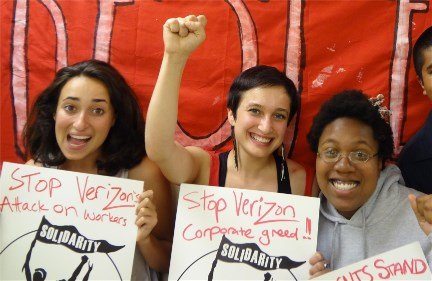
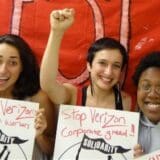
You’ve probably heard it from a colleague, or maybe from a friend or family member:
“Kids these days… they’re just too ambivalent to care about labor unions or workers’ rights.”
But as it turns out, that’s just not true. Young people are actually big fans of unions. Fully 61 percent of young people view labor unions favorably – and that’s more than 10 points higher than the national average, according to a new Pew poll. In fact, young people are the only age group that views unions more favorably than they view corporations.
But despite the overwhelming support young people have for unions, they’re far less likely to belong to one. Harold Meyerson writes in the American Prospect:
The irony for unions —and in theory, the opportunity—is that the youngest Americans are the least unionized.


Helicopters hover like hellish hogs
of Armageddon:
an infra-red shakedown.
We are the enemy, the face on the radio;
burnt petals cluttering the sidewalk.
We are daylight’s demise, dancing between
discord & distrust. All is bitter harvest,
betrayal and bewilderment;
all is seed for the fields of retreat:
bullets punctuate every poem.
——————————————————–
Source: Trochemoche, published by Curbstone Press (1998).
Luis Rodrίguez has won numerous awards for his poetry, including the Poetry Center Book Award, a PEN Josephine Miles Literary Award, and a Paterson Poetry Book Prize. He is best known for the 1993 memoir of gang life, Always Running: La Vida Loca, Gang Days in L.A. (paperback by Touchstone Books/Simon & Schuster).
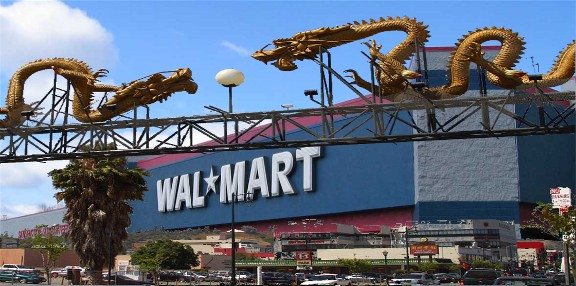

Tomorrow the fate of Chinatown residents and small businesses will be decided by the Superior Court. For the past 18 months, Chinatown residents and community activists across the city have been fighting Walmart’s attempt to open a grocery store in the historic downtown neighborhood. Now a judge will weigh the right of Asian-American communities to have a voice in what is built in their neighborhoods versus a multinational corporation’s ability to open just one more store. The lawsuit filed by the Asian Pacific American Labor Alliance (APALA) and its allies seeks to nullify the building permits granted to Walmart by L.A. city officials.
As we at APALA prepare for the trial, I have been reflecting on our civil rights and labor struggles in the Asian-American community. It’s the same battle that Chinatown residents fought against Union Station displacement and that Japanese Americans fought to reclaim Little Tokyo in the wake of internment camps and recent gentrification.


 Judy West is a founding member and current president of Local 741 of the American Federation of State, County and Municipal Employees union (AFSCME). She also works for the Los Angeles Department of Recreation and Parks as a recreation assistant and teaches “parent-and-me” classes. The department’s only fulltime employees are its directors and other administrators – assistants like West work halftime. Frying Pan News reporter Luke Dowling sat down with her to talk about the state of unions in Los Angeles.
Judy West is a founding member and current president of Local 741 of the American Federation of State, County and Municipal Employees union (AFSCME). She also works for the Los Angeles Department of Recreation and Parks as a recreation assistant and teaches “parent-and-me” classes. The department’s only fulltime employees are its directors and other administrators – assistants like West work halftime. Frying Pan News reporter Luke Dowling sat down with her to talk about the state of unions in Los Angeles.
Frying Pan News: Tell me a little about yourself and how you came to be president of AFSCME Local 741.
Judy West: I was one of its organizers and was treasurer for a while, then became president. We had nothing before we organized. When a union rep came in and said, “We’ve been asked by different rec assistants to organize a union,” I said,
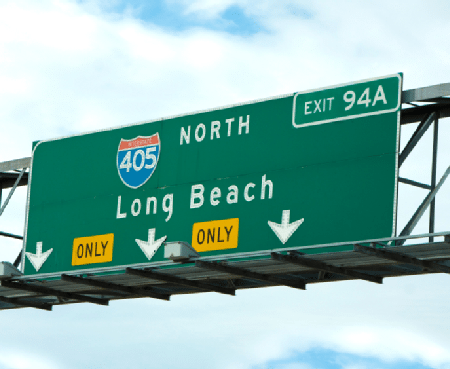

You get the basics in high school. The federal government is divided into three branches (executive, legislative, judicial). Locally you’ve got the mayor and the city council. Etc. Most of us don’t graduate with enough knowledge so that as adults we truly grasp how even the most well-known governmental power structures really work (what percentage of Americans can actually explain the Electoral College?), let alone more obscure power centers.
The Long Beach Coalition for Good Jobs and a Healthy Community is aiming to redress this lack of knowledge through a series of Power Analysis Workshops (or PAWs), which the coalition says are intended “to build collective knowledge of the power of local government [, …] of where branches of government get their power, how they impact the community and how residents can ensure local government works for all residents.”
“It’s important that all residents are engaged in the political process and understand how the decisions their representatives make impact their daily lives,” says Christine Petit,
» Read more about: Teaching the ABCs of Power in Long Beach »